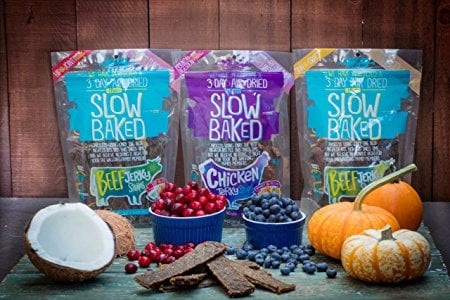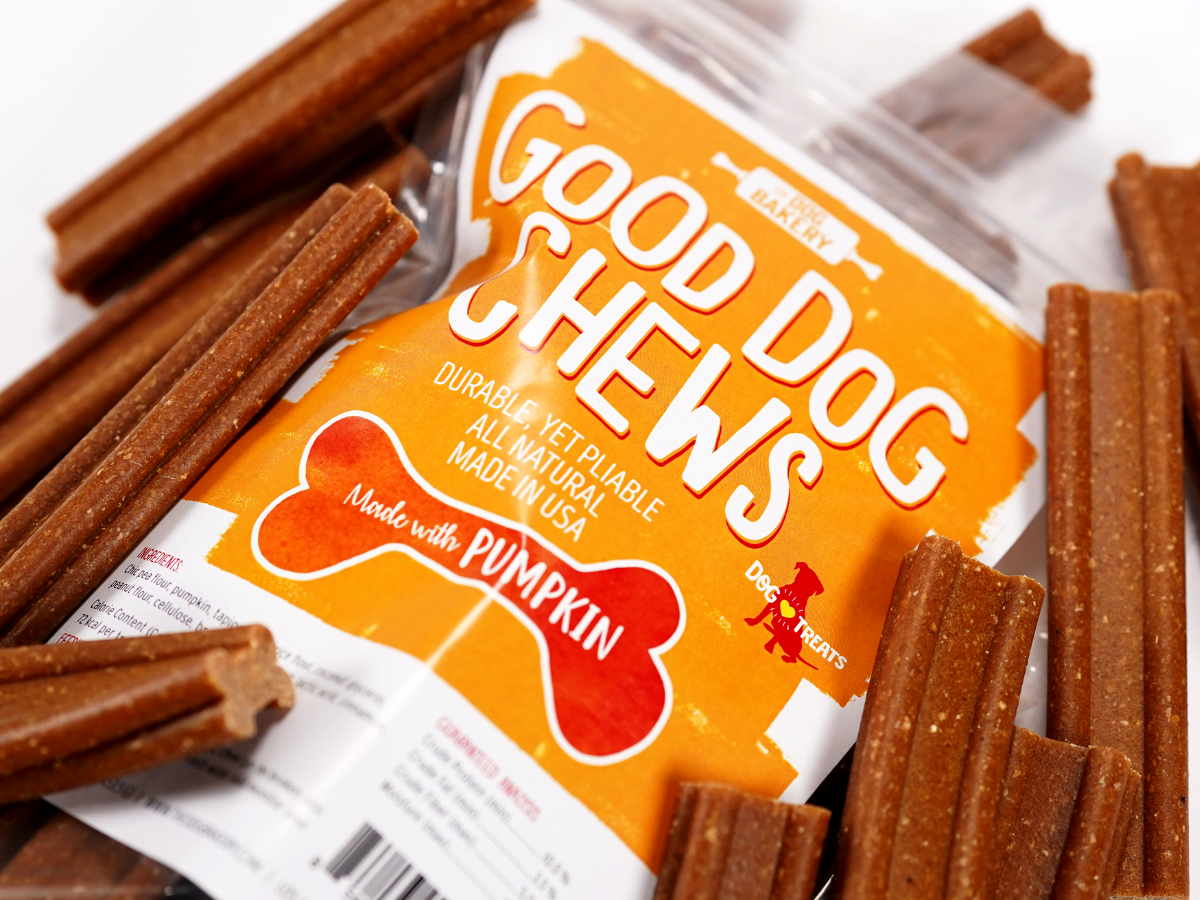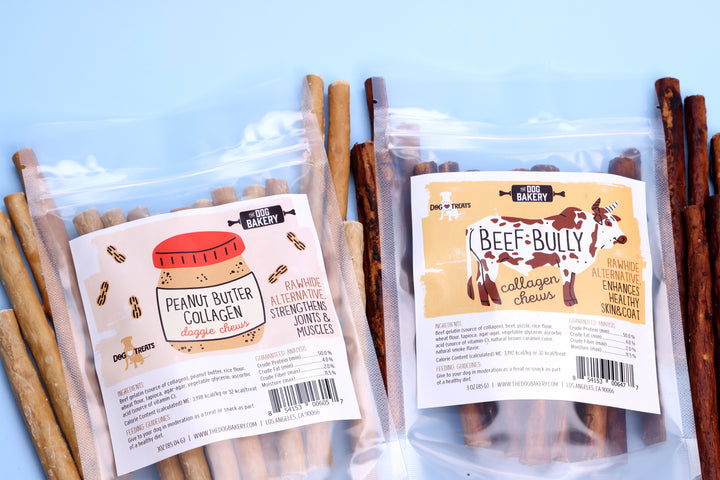A Rainbow of Dog Poop 💩 What Your Dog’s Poop Color Means
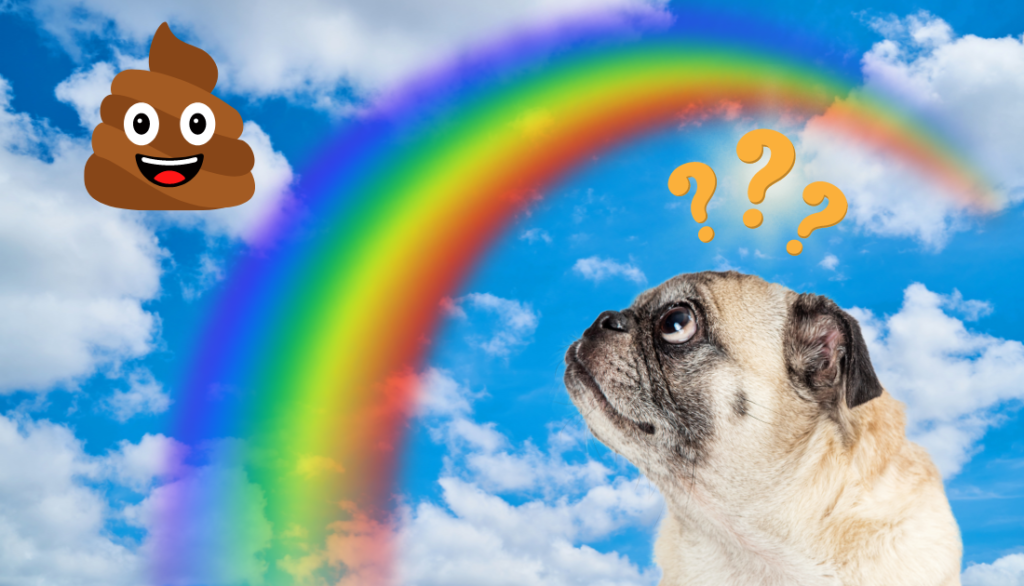
If only we could ask our dogs to tell us how they feel… unfortunately, dogs can’t speak English, and we can’t speak dog! That’s why it’s up to every dog owner to stay vigilant about their puppy’s health. One of the best ways to do so is by looking at your dog’s poop! (Read on to learn how to tell if something’s wrong with your dog based on their poop color.)
Why Color Matters
Color variations in your dog’s poop often indicate digestive problems. Since the stool is what most pet parents have the most access to examining, it’s easy for someone to tell if their dog’s stool is slightly different from other times they’ve gone to the bathroom. Just like with people, differently-colored stool can mean a variety of things. That’s why going to the vet with a stool sample is essential if you spy a colorful poo!
What Should Dog Poop Look Like?
Before getting into the vast array of poop colors, let’s establish a baseline for what a healthy dog’s poo should look like. Generally speaking, a healthy dog’s poop should always be brown, oblong, and proportionate to how much they’ve eaten. Healthy stool will also hold its shape but still be relatively moist.
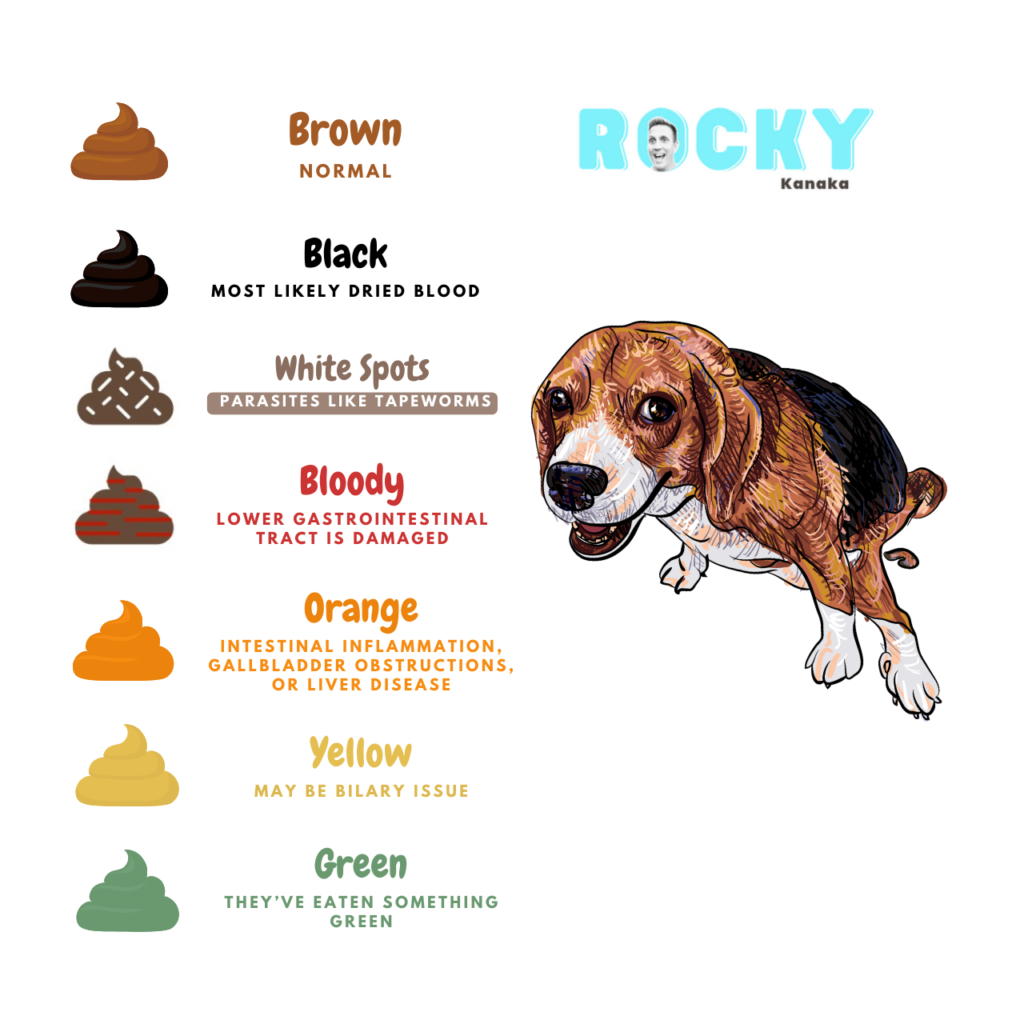
Texture Variations
If your dog’s poop has a different texture than we’ve described, consider speaking to a vet. Generally, smaller, pellet-like, or hard poops indicate dehydration. Runny or extra-moist poops may indicate digestive problems.
⚫️ Black Dog Poop
If your dog’s poop is black, it’s most likely dried blood. The black color comes from blood that’s had time to dry and coagulate as it travels through the digestive tract and indicates that something is wrong with your dog’s upper digestive tract. To treat this type of stool, bring a sample to the veterinarian as soon as possible, and schedule a checkup too.
Dried blood in your dog’s stool is a symptom of many different conditions, all of which may cause internal bleeding or ulcers.
When not to Worry
If your vet has recently prescribed activated charcoal for your dog, your dog’s stool will appear black. Activated charcoal is a common treatment for ingesting toxic substances, and doctors use it for humans, too!
Dog Poop With White Spots
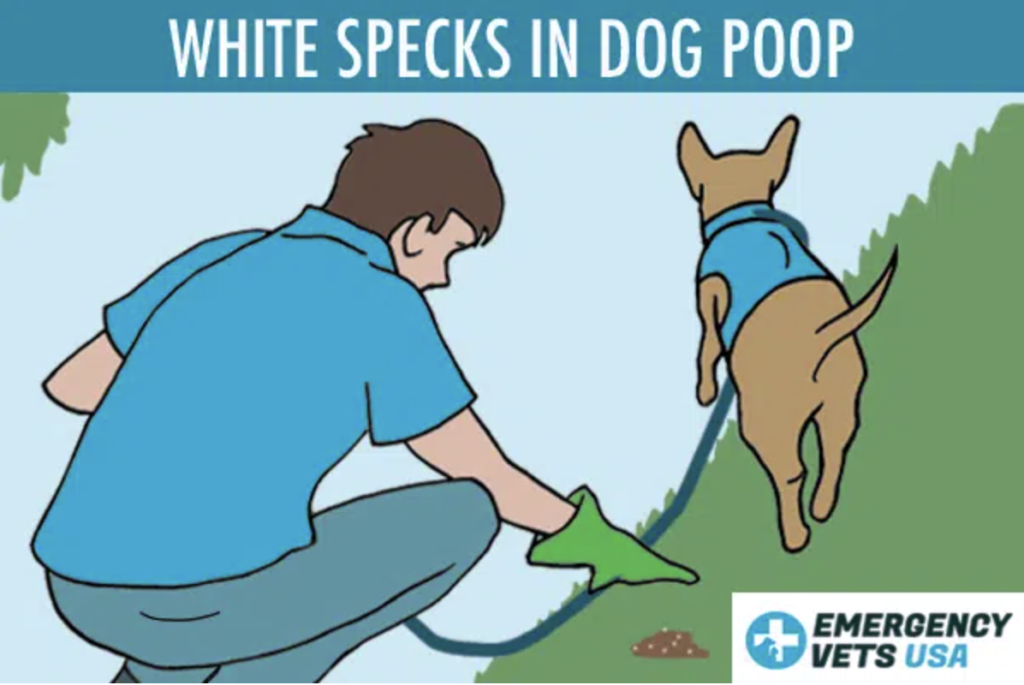
If your dog’s poop is a healthy color but has white spots in it, you should consider calling the vet. The most common cause of white specks in dog poop is parasites like tapeworms. However, undigested food, pieces of bone, or parts of a dog toy may also be the cause. To rule out tapeworms and other parasites, take a stool sample to the vet as soon as possible.
When not to Worry
If your dog’s poop has been sitting out for a while and you see white spots in it, there’s a high possibility that some flies have decided to lay eggs in it. Remove the poop from your yard immediately to prevent future gastrointestinal problems.
Bloody Dog Poop
If your dog’s stool is red or has red streaks in it, your dog’s lower gastrointestinal tract is damaged. Fresh blood in stool indicates a variety of things in dogs, just like it does with humans. The emergency veterinarian hotline VetsNow, states that bloody stool could indicate hemorrhoids, constipation, bacterial infection, colon cancer, poisoning, or long-term GI problems like parvovirus or hemorrhagic gastroenteritis.
🔶 Orange Dog Poop
According to Doctor Tiffany Ruiz Dasilva, there are four main reasons why your dog’s poop may be orange, three of which are significant causes for concern:
- Intestinal inflammation. There are many reasons why your dog’s intestines may be inflamed, ranging from parasites to infections to irritable bowel syndrome. If your dog’s poop is orange, take them to the vet for a checkup and watch for other telling symptoms to rule out serious causes for concern. Then, try switching around the proteins in your dog’s diet to avoid flare-ups.
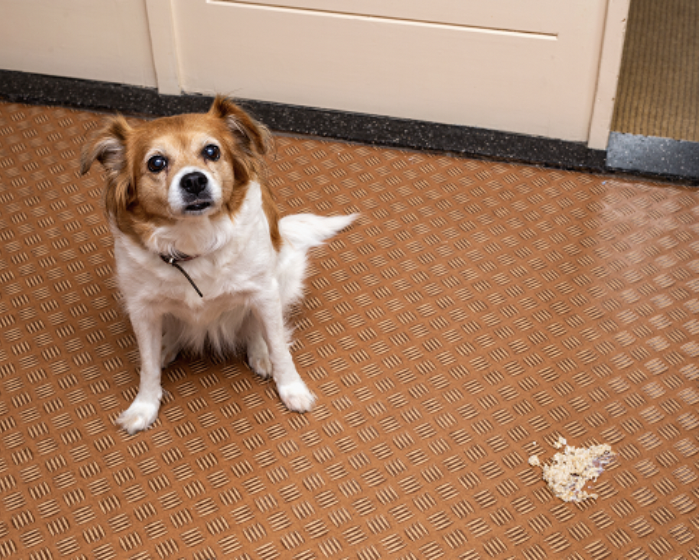
- Gallbladder obstructions. The gallbladder helps break down fats during digestion by producing bile. When there’s something in the way of the gallbladder’s bile duct, your dog’s poop will change color. Often, gallbladder obstructions are caused by mucus buildup, muscle swelling, or gallstones. To check for gallbladder obstruction, monitor your dog’s behavior. There are several other accompanying symptoms to look out for, including:
- Loss of appetite
- Increased drinking
- Weight loss
- Jaundice
- Abdominal pain
- Fever
- Diarrhea
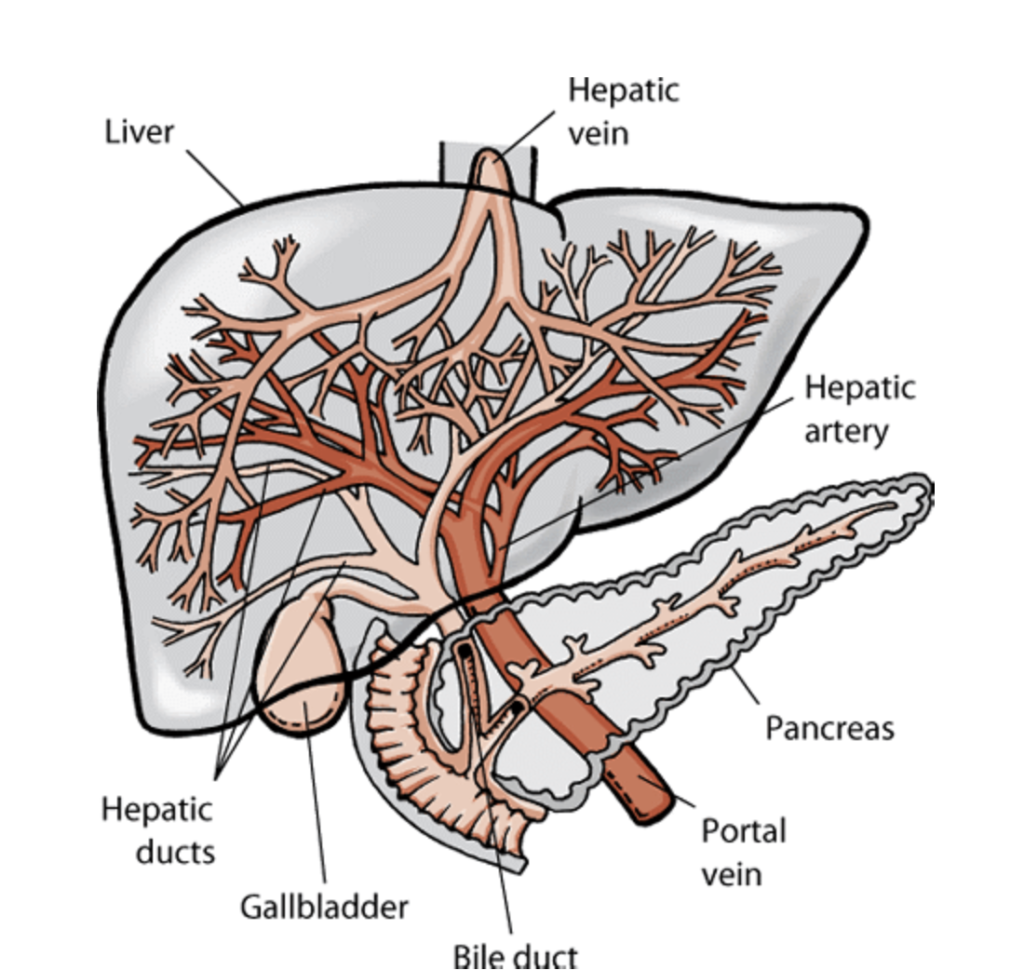
- Liver disease. Liver disease and liver failure may cause your dog’s poop to turn orange, which can seriously affect their digestive system. However, liver disease comes with a variety of other symptoms that all pet parents should watch out for, too, including:
- Frequent urination
- Increase in thirst/water consumption
- Bloody urine or poop
- Weight loss
- Loss of appetite
- Pain around the kidney area
- Diarrhea
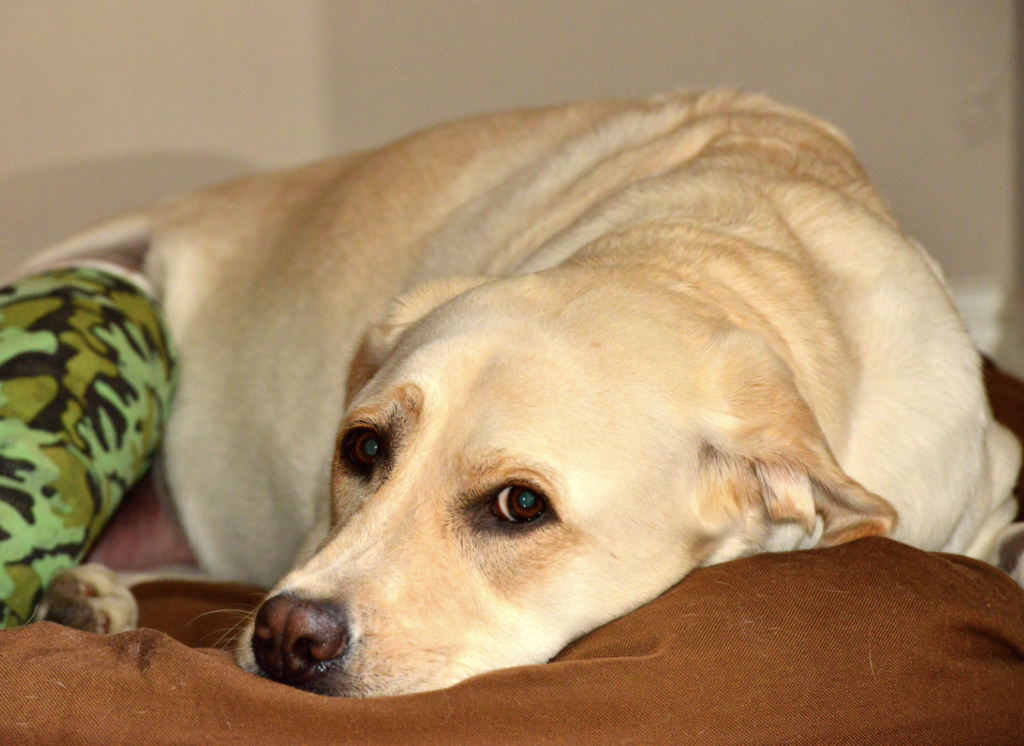
When not to Worry
If your dog’s recently eaten something orange– whether they’ve gotten into crayons or eaten some carrots or pumpkin– you shouldn’t have to worry as much about your dog’s health. If you’re concerned that they’ve gotten into something they shouldn’t have, contact the veterinarian immediately and monitor your puppy for any signs of poisoning.
💛 Yellow Dog Poop
There are many shades of yellow dog poop, but they usually trace back to yellow bile. Bile is a substance produced by the gallbladder that helps break down fats during digestion. Changes in diet or reactions to medication are common causes of bile-related digestive issues, but they can also indicate other, more serious concerns. Typically, orange poop is a sign of serious problems, but yellow stool can also indicate them as well. Serious gastrointestinal concerns like liver disease or gallbladder obstructions always come with additional symptoms, including:
- Frequent urination
- Loss of appetite
- Bloody urine
- Jaundice (skin or eye yellowing)
- Vomiting
- Abdominal pain
- Weight loss
- Yellow stool for more than two days
Yellow Mucus in Dog Poop
Arguably the least concerning of the yellow poops, finding yellow mucus in your dog’s stool means that something’s upsetting their digestive tract. Food allergies and intolerances, for example, are significant causes of stomach upsets in dogs. Irritable bowel syndrome is another common cause of yellow mucus in poop, as it’s usually a sign of a flare-up.
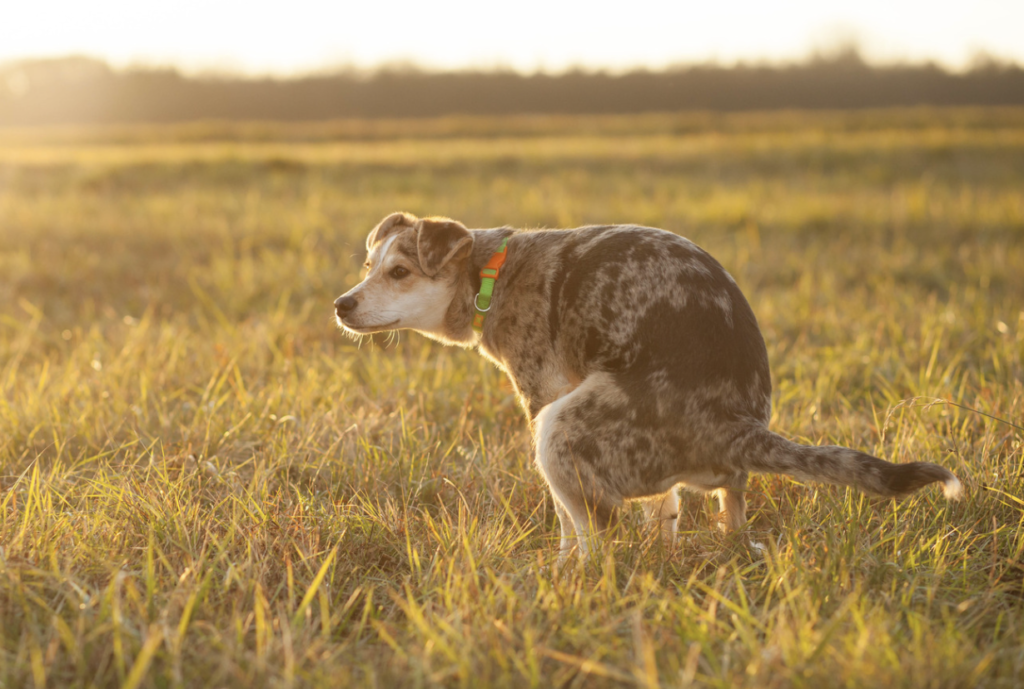
Sometimes, parasites also cause yellow mucus in your dog’s poop. The best way to rule out parasites with your dog is to take a fresh stool sample to the vet for testing.
Yellow Specks in Dog Poop
Yellow specks in your dog’s poop are caused by two things: corn and tapeworms. Corn isn’t too concerning, so let’s focus on the tapeworms instead.
Tapeworms are gastrointestinal parasites that lay white or yellow eggs about the size of a grain of rice. They usually spread through infected food or when your dog consumes an infected dog’s poop or vomit. Hunting dogs may contract tapeworms from eating an infected animal. Tapeworms steal nutrients from your dog during digestion and usually come with other symptoms besides specks in your dog’s poo. For example, a dog struggling with tapeworms may also have an increased appetite but decreased energy. They may also lose weight rapidly or struggle to gain weight if previously underweight.
Tapeworms and other parasites are easily disposed of with a one to two-week prescription from your veterinarian. If you’re concerned that your puppy may have contracted tapeworms or other gastrointestinal parasites, call the vet immediately and send them a fresh stool sample for testing.
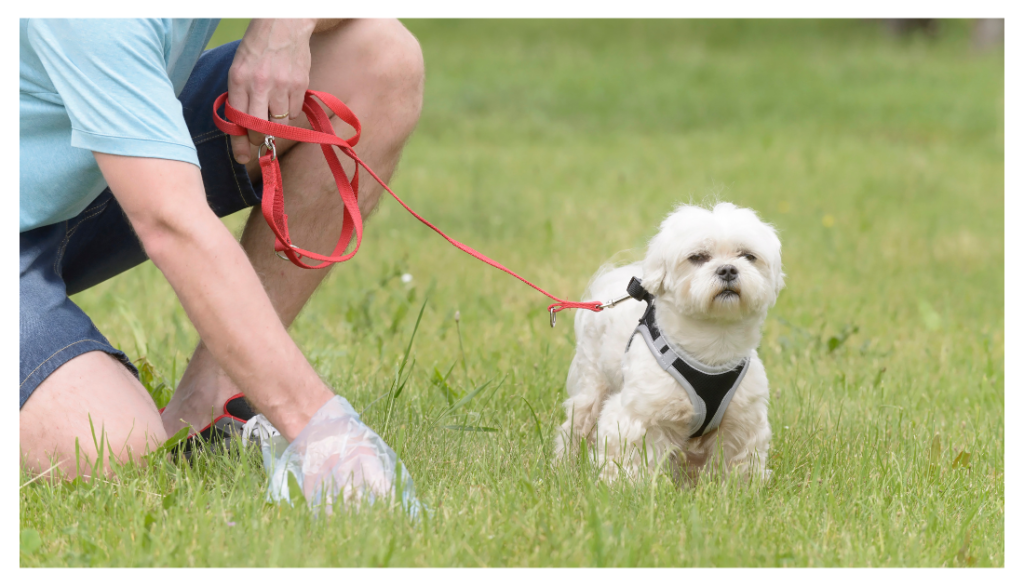
Runny Yellow Dog Poop
Diarrhea in dogs is often a sign that something is wrong with their digestive system. When combined with yellow stool, your dog is likely struggling with an extremely upset stomach. Check to see if your dog is rushing to go right after they eat or if they have to go a few hours after taking a new medication. If runny, yellow poops happen multiple times a day for a few days, contact your vet for some tests.
When not to Worry
If your dog’s recently eaten something yellow, like corn, there’s significantly less cause for concern. Alternatively, yellow dog poop may also indicate gastrointestinal inflammation caused by irritable bowel syndrome or food allergies. To ensure your puppy gets enough protein in their diet without irritating their intestines, speak with your veterinarian about alternative protein options.
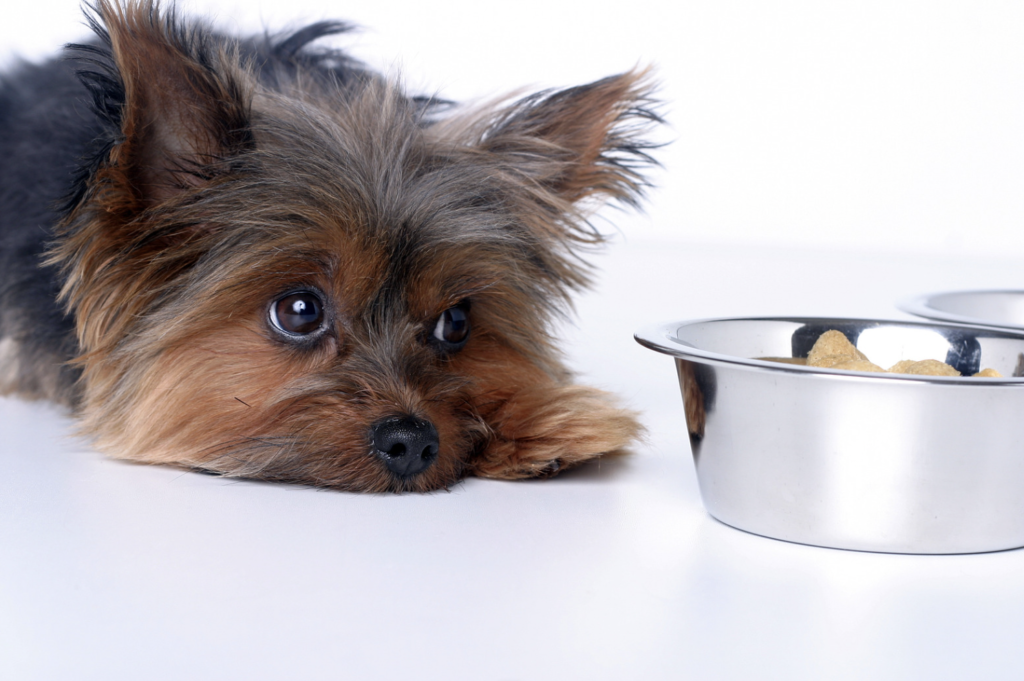
💚 Green Dog Poop
The leading cause of green dog poop is simply that they’ve eaten something green. It’s completely normal for your dog to chew on grass or eat vegetables like spinach and lettuce during the day. The chlorophyll in these plants essentially acts as a dye that turns poop green. Sometimes, blue things have a similar effect too.
To make sure that your puppy isn’t getting into potentially dangerous substances, make sure you keep them out of reach. If you see your dog acting sluggish or vomiting, consider calling poison control to make sure they haven’t eaten anything toxic.
What to Do if Your Dog’s Poop is Irregular
If you’re concerned about the color of your dog’s poop, the best thing you can do is to take a stool sample to the veterinarian. A visit to the vet can help you rule out potential life-threatening or severe conditions.
At home, you can do some sleuthing of your own, too; has your dog eaten something colorful recently? Are they starting a new diet or medication? Have they been constipated for a while? Depending on your answer, your dog might be struggling with an upset stomach, or they’ve eaten something colorful! To ensure your dog’s diet is stress-free, check out our vet-approved dog recipes!
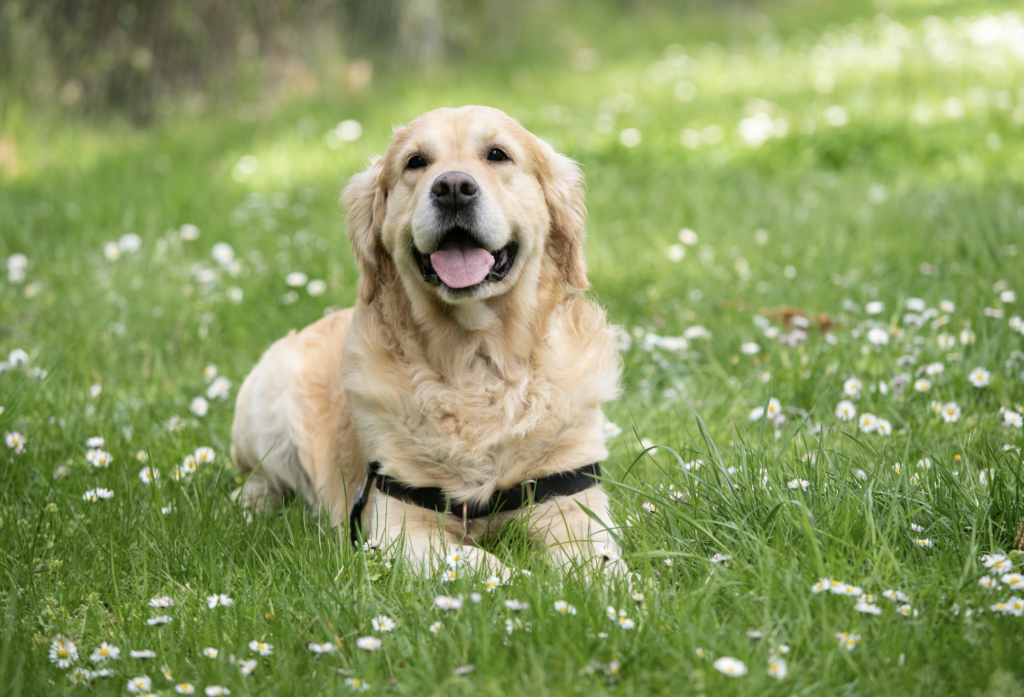
Frequently Asked Questions
Why is My Dog’s Poop Black?
If your dog hasn’t eaten anything black recently, black stool is a sign of upper gastrointestinal bleeding or damage. Contact a veterinarian immediately and conduct a stool sample test to determine the cause of your dog’s poop problems.
Why is My Dog’s Poop Green?
Green poop is usually a sign that your dog’s eaten something green or blue. Greens like spinach and grass are the most common ways to turn poop green, but blue fruits like blueberries may have a similar effect.
What Does Yellow Dog Poop Mean?
Yellow dog poop is often a sign of an upset GI tract. Unless your dog has a history of irritable bowel syndrome or inflammatory bowel disease, has recently started a new medication, or has changed diets, bring a stool sample to the veterinarian.
Why is My Dog’s Poop Yellow and Runny?
Diarrhea is often a sign of other underlying conditions that affect your dog’s digestive system. Yellow, runny poop may be a sign of liver disease or complications with the gallbladder. Monitor your dog’s eating and drinking habits to spot other potential symptoms of these conditions.
Is it a problem if my dog’s poop is orange?
Orange dog poop can be a sign of a liver or biliary issue, or it could indicate a diet that is high in beta-carotene. If your dog’s poop is consistently orange, it is best to consult with a veterinarian to determine the underlying cause.
What causes my dog’s poop to be dark brown?
Dark brown dog poop is considered normal as it indicates that the food has been digested properly. The color of the stool can vary depending on the dog’s diet and overall health.
Why is my dog’s poop light brown in color?
Light brown dog poop can be a sign of a diet that is high in carbohydrates or a lack of bile.
What does it mean if my dog’s poop is gray?
Gray dog poop can be an indication of a problem with the liver, pancreas, or gallbladder. Or, if the poop has been laying around for a while, sometimes old poop will turn white,
Can my dog’s poop color indicate health problems?
Yes, the color of a dog’s poop can indicate health problems. Any persistent changes in color, consistency, or frequency should be brought to the attention of a veterinarian. Additionally, other signs such as vomiting, loss of appetite, or lethargy can be indicators of a larger health problem.
How often should my dog poop?
The frequency of your dog’s bowel movements can depend on a variety of factors, including their age, diet, and overall health. However, most dogs will poop at least once a day.
Can my dog’s poop have a foul smell?
Yes, it is normal for dog poop to have a certain level of odor. However, if the smell is excessively foul or has a strong metallic or ammonia-like odor, it could be a sign of an underlying health issue.
Can my dog’s poop be too hard?
Yes, if your dog’s poop is consistently hard or dry, it could be a sign of dehydration or a diet that is lacking in fiber. It is important to ensure that your dog is drinking enough water and receiving a balanced diet.
How can I prevent my dog from eating their own poop?
Coprophagia, or the act of eating poop, can be a common issue in dogs. To prevent this behavior, make sure that your dog has access to plenty of clean water and a well-balanced diet. Additionally, supervise your dog when outside to prevent them from eating poop from other animals.
What should I do if I see blood in my dog’s poop?
If you see blood in your dog’s poop, it is important to seek veterinary attention right away. Blood in the stool can be a sign of a serious health issue, such as an infection or inflammation in the digestive tract.
Is it normal for my dog to strain when pooping?
Occasional straining when pooping can be normal in dogs, especially if they are constipated or have eaten something that is difficult to digest (Just like us, sometimes pooping is more difficult than other times but generally no cause for alarm.)
What can I do to keep my dog’s poop from smelling so bad?
While some odor is normal, there are steps you can take to reduce the smell of your dog’s poop. These include feeding a well-balanced diet, providing plenty of clean water, and cleaning up your dog’s poop promptly.
Is it safe to compost dog poop?
Composting dog poop can be done safely, but it is important to follow specific guidelines to prevent the spread of harmful bacteria. This includes using a designated compost bin, avoiding composting dog poop from sick dogs, and ensuring that the compost reaches high enough temperatures to kill off any bacteria.
The three foods that are super healthy and that almost every dog loves, even the pickiest dogs, are:
1. The Farmer’s Dog.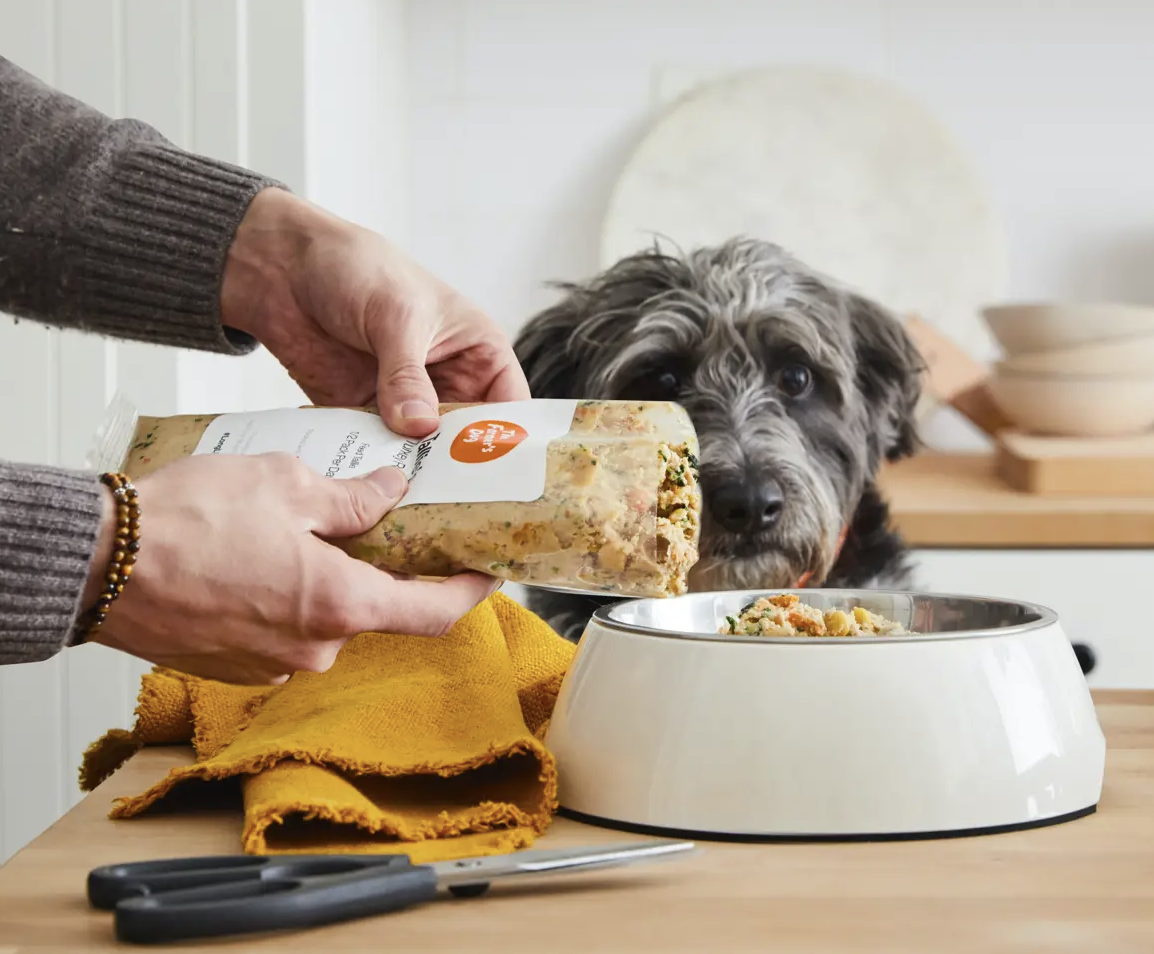
This is a fresh-frozen food that’s delivered to your home in just the right amounts for your dog. There are a number of fresh frozen dog foods available on the market and I tested them all. The Farmer’s Dog came up the winner with my picky dogs. You can see the fresh frozen food test here.
Save 60% on your first order
—
2. Sundays Food For Dogs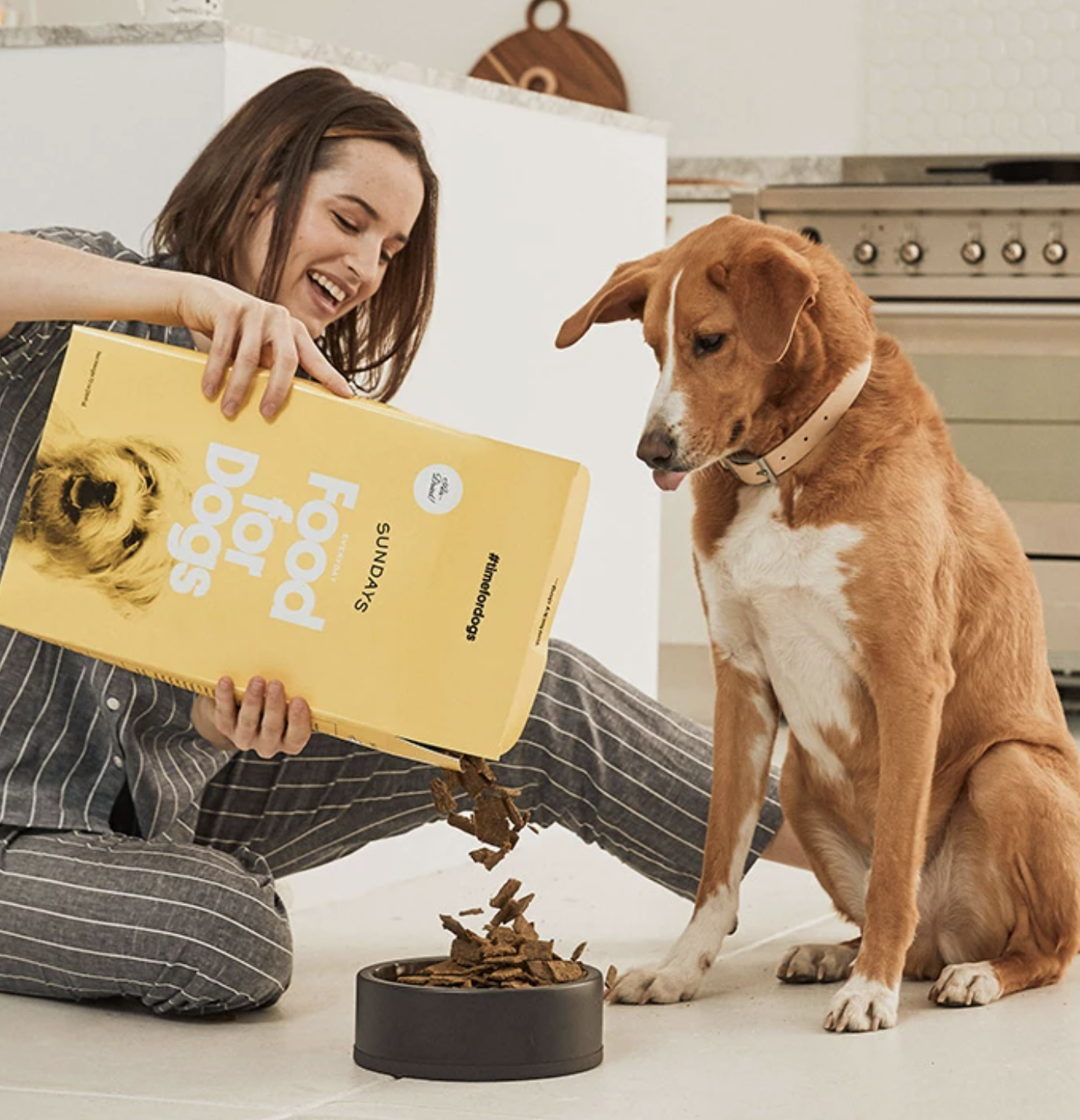
This is an air-dried food. It has the convenience of kibble (just pour it in the bow) but is much much healthier. It’s like little pieces of jerky, so dogs go crazy for it. There are a number of air-dried foods on the market. My dogs tested 3 of them. You can see the results of the air-dried food test here.
Get 35% off your first order + free shipping w/ code ROCKY35
3. We Feed Raw.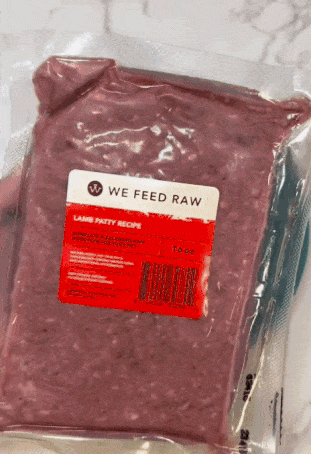
This raw food for dogs comes delivered to your home is perfectly sized portions for your pup. They primarily source their ingredients from trusted U.S. farmers, with two exceptions: venison and lamb. These ingredients are sourced from New Zealand, where some of the highest-quality and most ethically raised venison and lamb can be found. Pasture-raised and grass-fed and finished, we highly recommend trying these formulas if you’re interested in the best-quality ingredients. Save 25% on your first order.
Supplements: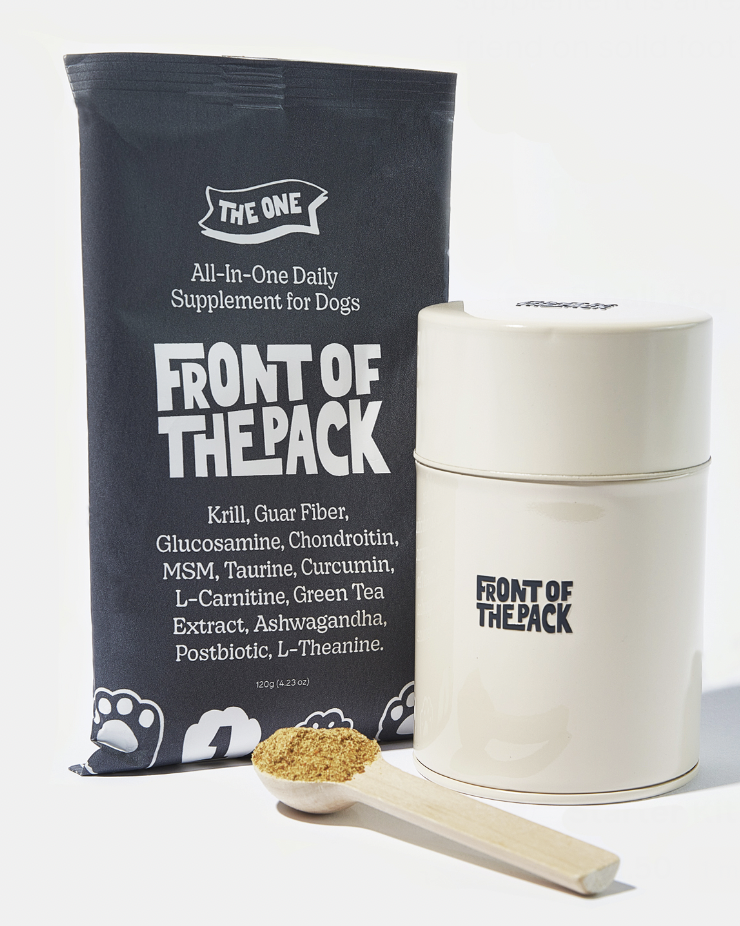
I highly recommend using a supplement on your dog’s food, not matter what you feed them, to ensure the meal is balanced and they are getting all the right supplements to help them stay healthy. The supplement I use is called The One from Front of the Pack. It has 12 ingredients that have been clinically-proven to keep your dog’s joints, skin, heart, digestion, and even their breath in tip-top shape. It’s also a powder, so easy to sprinkle on your dog’s food. For a limited time, when you buy one month you get a second month free.

